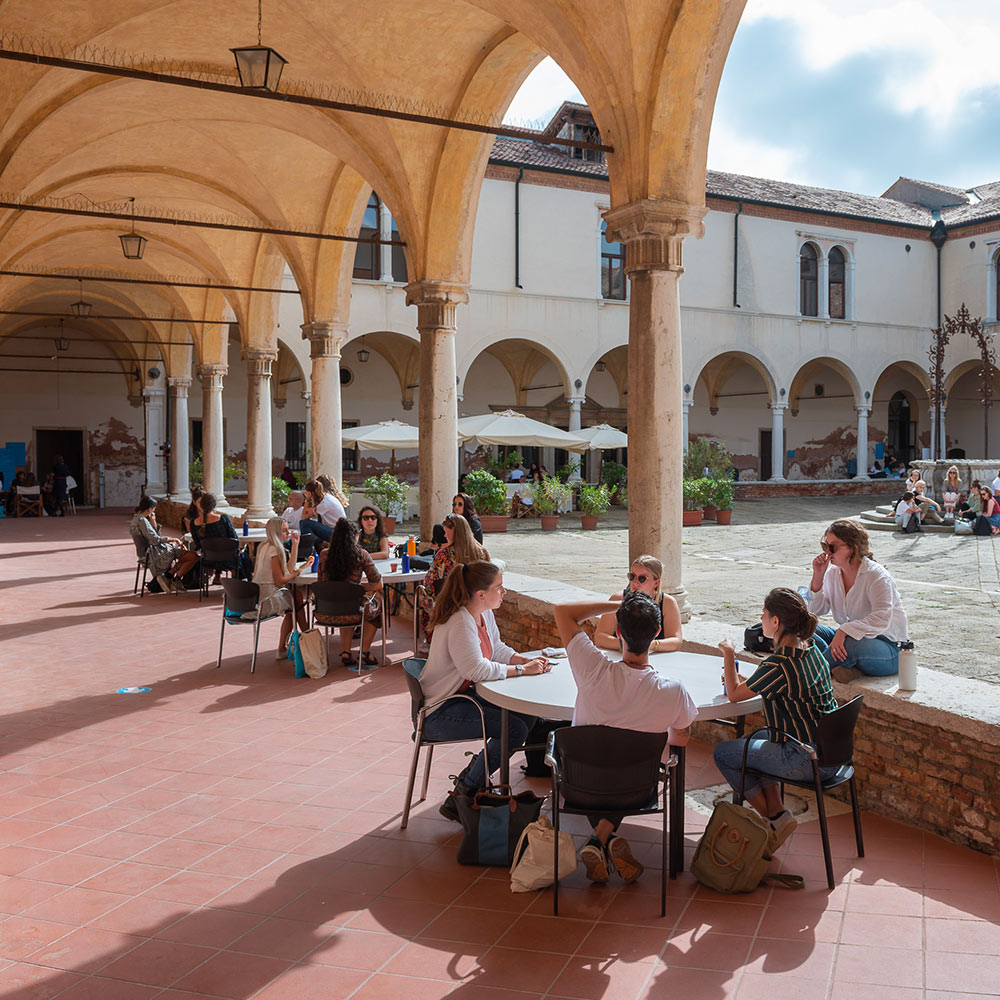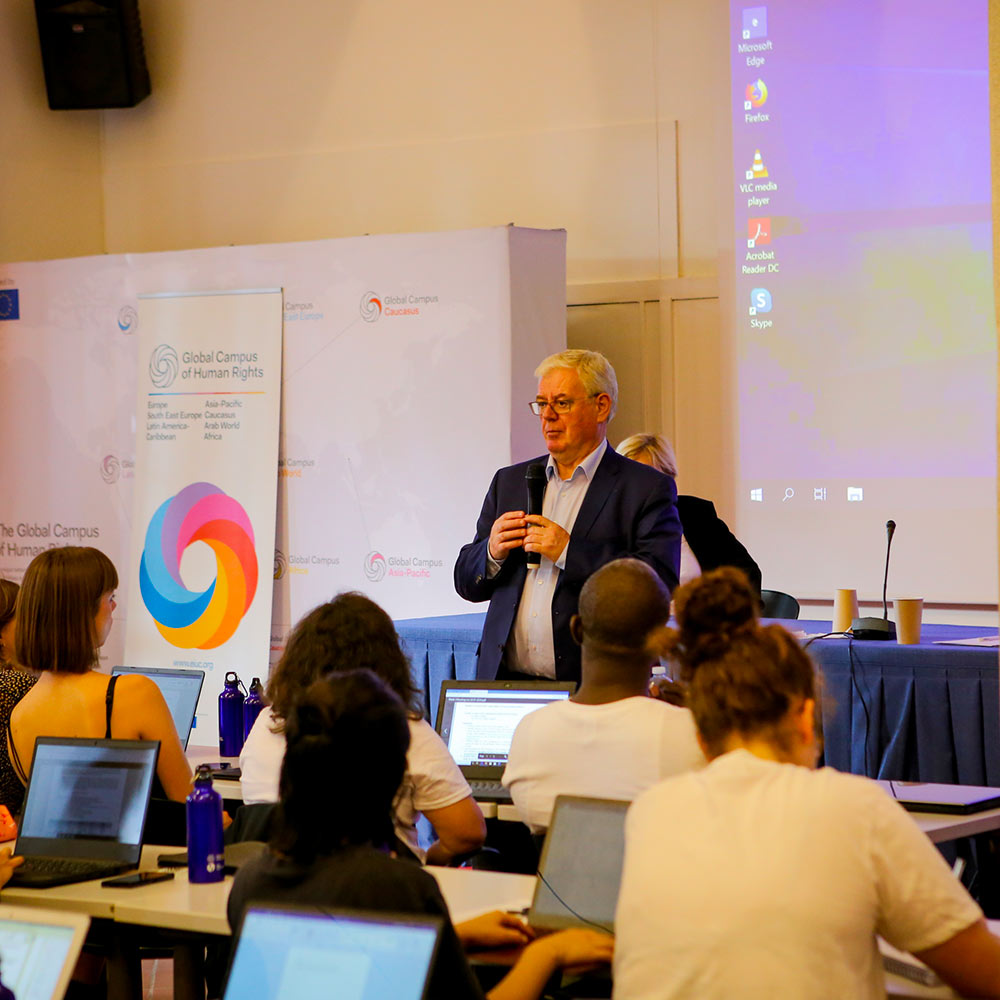About ema
The European Master’s Programme in Human Rights and Democratisation (EMA)
EMA is a one-year, full-time interdisciplinary programme that reflects the indivisible links between human rights, democracy, peace, and development. The programme offers an action- and policy-oriented approach to studying human rights and democratisation as well as offering an interdisciplinary approach to the intellectual and normative frameworks that underpin human rights and democratisation such as law, international relations, philosophy, history and anthropology.
While studying in a multicultural environment, students have the opportunity to be taught by leading academics representing the 43 EMA participating universities, representatives of international organisations (including the European Union, the United Nations and the Council of Europe), experts, activists and human rights defenders from civil society.
EMA is structured in two semesters that represent two different experiences. Students spend their first semester (September to January) at the Global Campus of Human Rights headquarters in Venice, during which faculty and practitioners come to teach in the first semester programme. In contrast, during the second semester students travel to and are hosted by one of the EMA partner universities where they follow courses and prepare a research thesis. Thus, mobility and exchange are at the heart of EMA, helping to build a European network of academics and practitioners who cooperate in designing and delivering the programme, and provide students with the opportunity to experience distinct academic settings in the first and second semester.
Since its establishment in 1997, EMA has prepared high-level professionals in human rights and democratisation to contribute as researchers, practitioners, and advocates across intergovernmental, governmental, and non-governmental sectors worldwide.
Global Campus Europe – EMA, inauguration of the academic year 2025-26 – Duration 1:08 min
Key Facts
- Start date: early September
-
Second intake deadline (for EU, self-funded applicants):
22 March 2026 - Duration: 12 months full-time
-
Tuition fee: € 6.450,00 (includes enrolment fee of € 150,00).
9 scholarships available -
Minimum entry requirements:
University degree (minimum 180 ECTS credits)
Certified fluency in English
WHY EMA?
Together our 43 participating universities and associated institutions are able to present rich and varied perspectives on human rights and democratisation that no single department or faculty can offer.
The EMA programme also attracts students from all over the world, from different academic disciplines and varied professional backgrounds. This creates a dynamic learning environment and a unique opportunity for informal, peer-to-peer learning. Our graduates are also connected to a thriving EMA alumni community of professionals who work on human rights and democratisation issues across Europe and the world.
The EMA programme is a unique example of inter-university cooperation. The academic programme has been jointly designed and developed by academics from our participating universities over the course of nearly 30 years. The diversity of network allows us to provide a diversity of expertise and perspectives that no single university faculty could provide on its own. The diversity and range of research topics addressed by EMA theses shows this strength clearly. EMA programme design also benefits from the collective expertise and experience of leading scholars from across 43 universities which creates a unique learning environment for our students.
The city of Venice has long been an international hub of trade, travel and exchange and this multiculturalism is reflected in the EMA programme. Each year we attract a cohort of students from dozens of countries across the world and from diverse professional and disciplinary backgrounds. Each year the EMA programme is delivered by a faculty of more than 70 academics from European and non-European universities as well as experts from international IGOs and NGOs, and extra-curricular online and in-person activities with students enrolled in other Global Campus regional master’s programmes.
The EMA programme is designed to bridge knowledge, understanding and practical skills in an integrated and mutually reinforcing way. Our graduates have in-depth knowledge of recent and current developments in the field of human rights and democracy and the scholarly debates that underpin the field.
On successful completion of the EMA Programme, our students can:
- Conduct independent research at advanced levels and critically evaluate and use a range of materials
- Communicate effectively, demonstrating clarity, organisation, argumentation, and presentation skills orally and in writing
- Conduct analysis on primary and secondary sources as a foundation for professional or academic work
- Participate in meaningful academic and policy debates
- Apply practical and operational skills across diverse work environments.
The EMA second semester is conceived as a European exchange, which means that students will be hosted in one of our participating universities. They are allocated to a second semester destination based on both their selected thesis topic and the university’s suitability and availability to supervise the thesis topic in any given year. As this part of the programme is considered an exchange, students will be hosted in a university located in a country other than their home country.
The city of Venice offers a unique student experience. The city’s intricate network of islands, canals, historic architecture, and rich cultural heritage create an unparalleled atmosphere. You will spend the 1st semester on the island of Lido, one waterbus stop away from Venice: classes take place in an 11th century historic building not far away from pristine beaches, elegant architecture, and biking routes (no, you cannot bike to Venice!).
The first semester culminates in a field trip in Kosovo in which students engage in human rights and democracy issues in a post-conflict setting. Each year students meet members of international, national and local human rights institutions, NGOs, civil society organisations, media outlets and the artistic community, and benefit from practice-oriented insight into the daily human rights work and the challenges faced by those in the field.
The Diploma (60 ECTS credits) is jointly conferred by the EMA “Inner Circle Universities” that have ratified the Joint Degree Agreement: University of Graz (Austria), Ruhr-University Bochum (Germany), University of Hamburg (Germany), University of Padua (Italy), Ca’ Foscari University of Venice (Itay), University of Ljubljana (Slovenia), and University of Deusto (Spain).
Further information on the EMA Joint degree can be found here.
As a mark of our success in inter-university cooperation the EMA programme was accredited through the European Approach for Quality Assurance of Joint Programmes in 2025. This approach defines the European standard for joint degrees that are based on the agreed tools of the European Higher Education Area. Led by Ruhr University Bochum, this positive accreditation decision is strong evidence of the high quality of the EMA programme and its basis in inter-university cooperation which has been developed over the course of nearly 30 years of delivering postgraduate human rights education.
What you will learn
EMA equips students with in-depth knowledge of recent and current developments in human rights and democratisation, while fostering a solid understanding of key theories, concepts, and methods. It encourages critical engagement with debates in the field and the ability to apply thematic, country-specific, and comparative perspectives.
EMA is a dynamic and demanding programme that requires a lot of engagement. The first semester is an intense study programme that exposes students to a wide range of topics, and each week led by a different professor and team of experts and practitioners from across our network.


